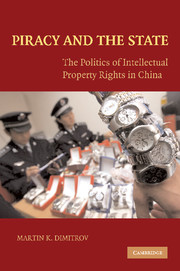Book contents
- Frontmatter
- Contents
- List of Tables
- List of Figures and GIS Maps
- Acknowledgments
- List of Abbreviations
- I INTRODUCTION
- II THE ORGANIZATION OF THE STATE: IPR ENFORCEMENT OPTIONS
- III THE STATE IN ACTION: THE POLITICS OF IPR ENFORCEMENT IN CHINA
- IV CONCLUSION
- 10 State Capacity and IPR
- Glossary of Selected Chinese Terms
- Index
10 - State Capacity and IPR
Published online by Cambridge University Press: 06 November 2009
- Frontmatter
- Contents
- List of Tables
- List of Figures and GIS Maps
- Acknowledgments
- List of Abbreviations
- I INTRODUCTION
- II THE ORGANIZATION OF THE STATE: IPR ENFORCEMENT OPTIONS
- III THE STATE IN ACTION: THE POLITICS OF IPR ENFORCEMENT IN CHINA
- IV CONCLUSION
- 10 State Capacity and IPR
- Glossary of Selected Chinese Terms
- Index
Summary
We cannot understand state capacity unless we know what the state does, and whether it does it well. The Chinese state is an enormous machinery of bureaucracies, courts, and police that enforces hundreds of laws and regulations. To date, we know surprisingly little about how this machinery is organized and actually operates. It is often difficult to find answers even to basic questions, such as which Chinese agencies enforce a given law or policy. A more important question, and one whose answer is even less well understood, is whether the machinery of the state is able to supply high-quality enforcement. This study answers these questions for the area of IPR. Although the main findings are derived from IPR, they have broad implications for our understanding of the Chinese state. First, the study develops a methodology for measuring the volume and quality of enforcement, one that can be used to assess state capacity in areas outside IPR. Second, the study presents general theoretical arguments about the conditions under which rationalized enforcement, and, by extension, the rule of law, may arise.
Several findings about state capacity emerge from this study. The key finding is that the presence of multiple bureaucracies with poorly defined and overlapping jurisdictions is a serious obstacle to the emergence of rationalized enforcement. A second, related finding is that, although a high volume of IPR enforcement already exists in China, in general this enforcement is uncoordinated, duplicative, inefficient, and unaccountable.
Information
- Type
- Chapter
- Information
- Piracy and the StateThe Politics of Intellectual Property Rights in China, pp. 271 - 284Publisher: Cambridge University PressPrint publication year: 2009
